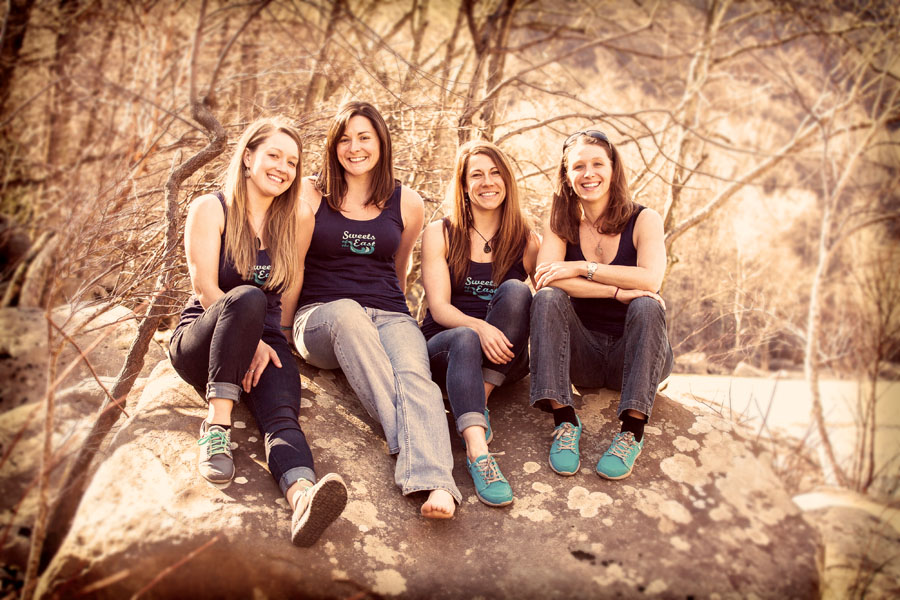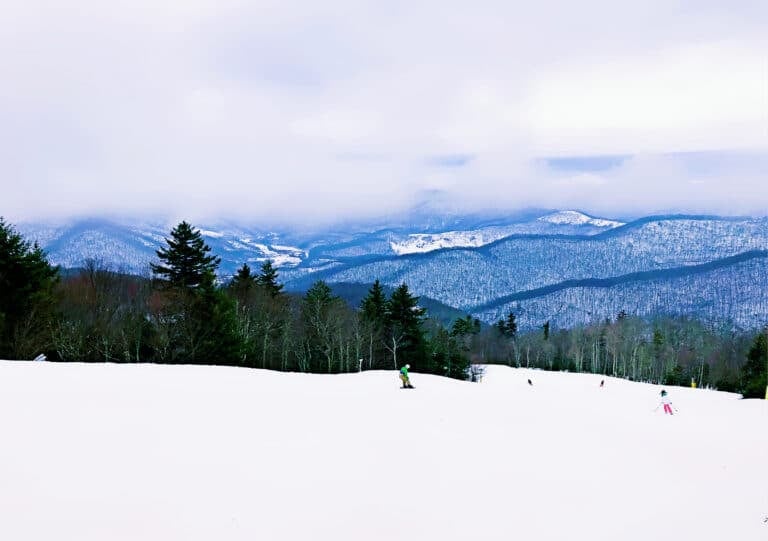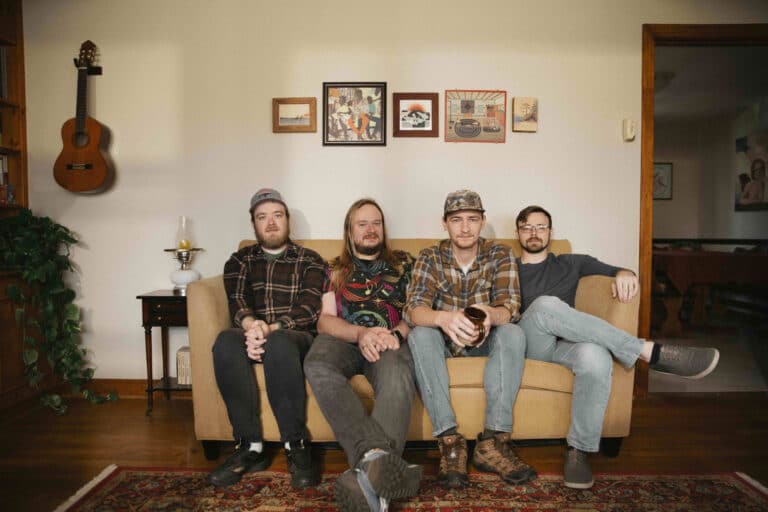On a brisk 20-degree Saturday in February, the parking lot at Fayette Station in the New River Gorge is shadowed in silence. During the rafting season, the lot teems with school buses idling side by side as guides shout commands and stack rafts to the frenzied buzz of customers pouring from the riverside. Recreational boaters are lucky to find a parking spot amid the sea of yellow paddles and blue plastic helmets and sun-bleached PFDs.
But in the dead of winter, the parking lot remains mostly empty except on the sunniest of days, and even then, most locals have already hung up their paddles for skis. Yet for nearly every weekend this past winter, the parking lot has regularly seen four raft guides donning drysuits and braving the elements in the name of competition. Meet the Sweets of the East.
The “Sweets” are an all-female rafting team based out of Fayetteville, W.Va. They’re also the sole East Coast competitive rafting team, male or female, vying for the chance to represent the U.S. at the International Rafting Federation (IRF) World Rafting Championships (WRC) next year in Japan.
“The international rafting scene is much bigger than I thought it was,” says 2015 WRC Team USA alternate and Sweets team member Jo-Beth Stamm. “The competitive rafting culture here in the U.S. is tiny. It’s such a fringe sport. But in these other countries, it’s extremely competitive and there are even countries that pay their athletes. It kinda allows [the athletes] to treat it as their job, and they take it super seriously.”
Last December, Stamm joined Team USA at Worlds, which took place on the Citarik River in Indonesia. Out of 16 women’s teams, Team USA placed eighth. Though she didn’t see the podium, getting a taste of the international stage was enough to light the fire in Stamm’s belly. When she returned to Fayetteville, Stamm set to work forming a team with fellow guide Sherry Spilker, a two-time National Championship contender. Together, Stamm, 33, and Spilker, 31, enlisted Adventures on the Gorge (AOTG) guides Margaret Cadmus, 31, and Hannah Vogt, 24, to form their four-person, or r-4, team.
“Honestly, it’s about time that we’ve had someone from the East go out and race in these races,” Cadmus says.
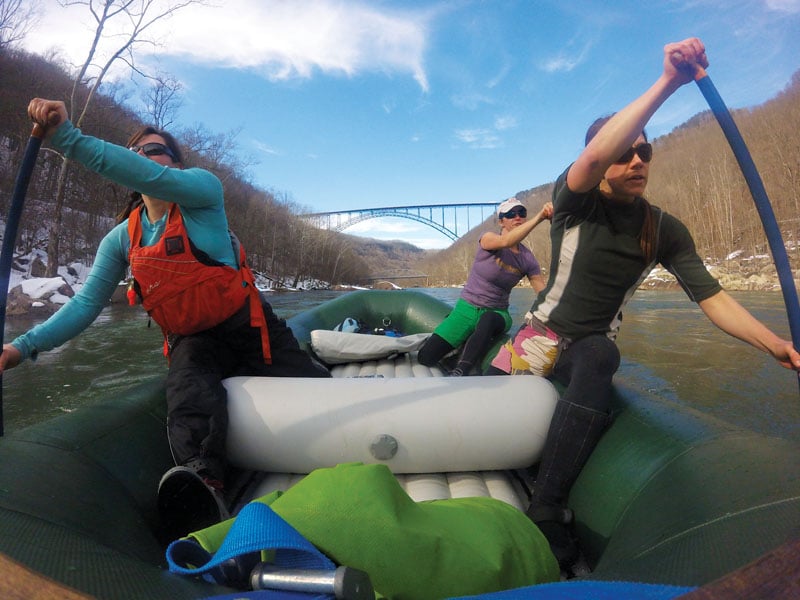
“Fayetteville is small, but we’re such a hub,” adds Vogt. “We have two amazing rivers, so we should be producing athletes that are nationally and world renowned. There’s no reason not to.”
Historically, the teams at Nationals hail from whitewater hotbeds like California, Colorado, and Oregon. But in 2003, Spilker joined a Fayetteville-based women’s team, one of the few in the town’s history, as an alternate at Nationals in Colorado, at which the team placed second. Spilker again competed at Nationals in 2014, and again the Fayetteville team ranked second. This past April, the Sweets competed at the 2016 Nationals in southern Oregon and placed third. For Spilker and the rest of the Sweets, the time to take home the gold is now.
“The New and Gauley are truly world-class rivers,” says Dave Arnold, Vice President and co-founder of AOTG. “For the last 20 or 30 years, if you see a list in any publication, the Gauley especially is in the top five. A person who has been trained on the Gauley and the New who is a five- or 10-year guide, they’re as good as you get.”
Earlier this year, AOTG announced its sponsorship of the Sweets, providing public relations, marketing, and fundraising assistance to the team. Despite the New and Gauley’s renown, for Arnold, who has spent 41 years in the whitewater industry, the Sweets represent a long overdue opportunity to put Fayetteville in the international spotlight.
“There are plenty of people in this state who could compete on the world class stage,” Arnold says, “but it’s a huge commitment of time and energy and passion and finances. [These women] are amazingly committed. They’re amazing at reading whitewater and working as a team, and the added benefit is, they’re really smart and pretty and they speak well. They love West Virginia, and if you compound all of that together, it’s kind of a dream team.”
Fayetteville is no stranger to the competitive rafting scene. For 25 years, the local Animal River Race on the Upper Gauley has attracted hundreds of kayakers, rafters, and even open boaters, though according to Stamm, “The Animal Race isn’t something you train for. You just show up and chug a beer and race.”
But back in 2001, Fayetteville hosted the only WRC to be held on United States soil on the Gauley River, drawing rafting teams from over 20 countries. While the event proved fruitful in showcasing the area’s whitewater resources to a niche international community, its significance was overshadowed in the wake of 9/11. Arnold hopes that the Sweets will not only breathe new life into Fayetteville’s whitewater reputation, but that they will also serve as role models for up and coming raft guides.
“These girls are not intimidated, I can tell you that right now,” Arnold adds.
“I think it’s going to show other girls that it’s totally possible and hopefully we’ll stir up some competition for ourselves,” says Cadmus.
The Sweets aren’t territorial, or even proud, of their sole East Coast team status. In fact, the team would like to see more East Coast teams competing at Nationals, and perhaps even forming their own regional race series. Both Spilker and Stamm have experienced a change in the sport’s vibe from fierce competitiveness to friendly encouragement, and they say that growing the sport, especially for women, is their ultimate goal.
“Everybody’s incredibly welcoming and there’s a lot of fantastic camaraderie,” says Stamm on her experience at Worlds. “At one point, I was shooting video when the rest of the girls were doing slalom practice, and the captain of the Brazil team came over and started giving advice, giving tips.”
And while the Sweets of course want to stay true to those pillars of support and inclusiveness off the water, when they’re on the water, it’s game time.
Guides Guiding Guides
Training for the Sweets has largely centered around one theme—time in the boat. Be it flatwater practice or downriver runs, the team was on the water every week this past winter, even if it meant sliding the raft down snow-covered banks to the icy river’s edge.
“Some days it was so cold our hands and feet would go numb and you’d feel like you’re going to puke,” Spilker recalls.
To escape the cold and continue to build strength, the team earned the support of the Holiday Lodge Hotel in nearby Oak Hill, W.Va., where they were able to use the hotel’s indoor pool free of charge. There they would meet twice a week to sit on the side of the pool and paddle in place for hours.
“We’re simulating sitting on the side of the raft,” clarifies Stamm. “The pool water isn’t aerated like river water is, so it builds a lot of strength.”
The stroke they practiced? The duffek, named after Czechoslovakian slalom paddler Milo Duffek. The duffek, also known as a bow rudder or hanging draw, is the most efficient stroke for entering and exiting eddies, which is the foundation of slalom racing. Commercial rafts are generally steered in the back by ruddering, sweeping, or drawing from one guide, but in races, directional aids like the duffek are given from the front.
“The person we call the ‘guide,’ for lack of a better term, is really just the person in the back who has the final say on where we go,” Stamm says. “That way we don’t have four people who all read water a little differently arguing about it.”
In effect, the Sweets have a team of guides guiding guides, which seems like a bonafide way to have a world class crew, except that no one person is calling the shots. Raft racing is teamwork at its essence and gaining that trust in one another has been the biggest challenge the Sweets have had to overcome.
“We’re all great guides and if you put us in a boat by ourselves, we can get down the river,” says Cadmus. “But some of us guide on the left, some of us guide on the right, some of us set up sooner. We all see different lines, so a lot of what we’re working on is surrendering to other peoples’ ideas and saying, ‘I trust you, I know you are a good guide, I’m going to paddle whenever you say, and we’re going to get there together.’”
Fortunately, rafting requires guides to have a sense of humility and respect for the river, so the Sweets are well acquainted with the consequences of hubris. They also recognize the importance of paddling and practicing together, as opposed to individually, to build better bonds between each of the team members.
“The National’s team last year didn’t get a practice together until they were at Worlds,” Stamm says. “They trained apart and when they got together, they couldn’t work the little kinks out because they were still working big kinks out. We decided early on that you have to be able to be here [in Fayetteville] if you want to be on the team. The team that paddles together gets to know each other better and how you’re going to react to certain things.”
Short of practicing trust, strokes, and sprinting, the team has been taking every opportunity to get on different rivers, or sometimes different sections of river, to increase their efficiency with technical maneuvers. Because the bulk of their training has been in the winter and spring, when river levels on already-big-water runs are higher than normal, the Sweets look to rivers and creeks like the Middle Meadow where tighter lines and more rocks allow them to practice river running skills like ferrying and catching eddies.
“The rivers are way more narrow than they are here,” Spilker says of runs out west. “Here you’re going for big waves and big hits but it’s more technical over there.”
Eyes on the Prize
The team will see the results of their hard work in just a few weeks at FIBArk, America’s Oldest Whitewater Festival, in Salida, Colo., from June 16-19. For the first year ever, the U.S. Rafting Association will be hosting its 2017 Worlds qualifier one year in advance, as opposed to the year of, to give teams more time to raise money for travel. Due to IRF regulations, which require Worlds to alternate between teams of four and teams of six, two additional rafters, Jillian Rex and Julia Schneider, will join the Sweets at Nationals in Colorado.
Each team must compete in four disciplines. The time trial, or sprint, garners the least amount of points but is by no means easy, requiring teams to paddle hard for a short distance; the head-to-head literally pits two teams against each other in a fast-paced sprint through a rapid; the slalom is the most technically challenging of the events where teams negotiate their rafts through 12 downriver and upriver gates; the downriver race is somewhere in the vicinity of eight miles, or one hour, of racing and usually is a stretch of class IV whitewater. The team with the most overall points wins.
The Sweets swap “guides” for each discipline, depending on individual proficiencies. According to Stamm, who captains the raft for the downriver race, the Sweets are prepared to bring the heat, feeling especially confident in the downriver discipline. Considering the downriver race alone accounts for 40 percent of the team’s four-part score, this is a welcome assurance indeed. The Sweets predict that as many as seven women’s teams could be competing for the chance to represent the U.S. at Worlds.
“Competition is going to be a little thicker this year, but hopefully West Virginia can come out of second place,” says Spilker.
Meet the Sweets
Jo-Beth Stamm
Started guiding: 2005
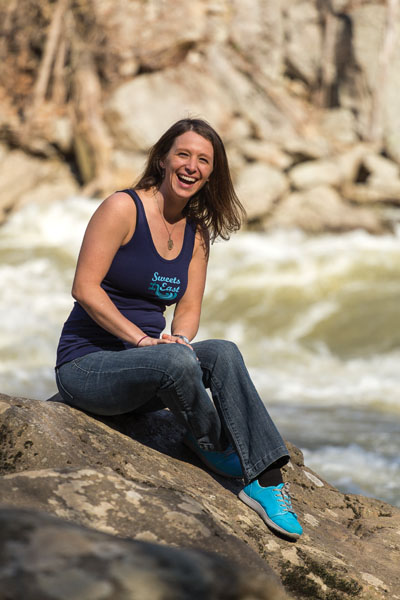
First memory on a raft: was a youth group trip rafting on the Lower Youghigheny. It was super scary. We flipped at Dimple and I thought it was the scariest thing ever. I said to myself, ‘I’m never rafting again.’ I was 15 or 16.
Started guiding because: Brian Jennings told me I should be a raft guide.
Most embarrassing moment on a raft: I got my butt kicked by my favorite rapid on the Gauley this year. I felt betrayed by Lost Paddle!
Hannah Vogt
Started guiding: 2014
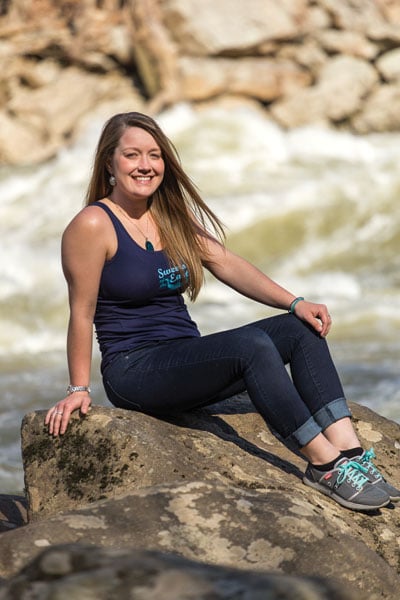
First memory on a raft: was when I was 14. My family came to Fayetteville and we did a family rafting trip. That became a regular family vacation.
Started guiding because: I was a leader for Adventure West Virginia at West Virginia University. We would take 22 incoming freshman and travel around the state of West Virginia and go backpacking, rock climbing, and whitewater rafting. I was down in Fayetteville every other week rafting and got to know a lot of the guides.
Most embarrassing moment on a raft: We had really, really low water last year, and there’s a rapid called Lower Railroad. I did not do a move correctly and went way off line. We kinda parked on a rock and I went head over heels in front of at least 10 other boats. There were at least four video boaters who caught it on video. I scraped all the skin off my knuckles.
Sherry Spilker
Started guiding: 2003
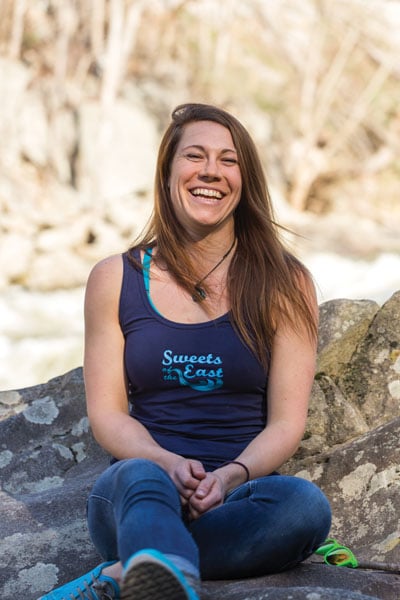
First memory on a raft: When I was 12, my Girl Scout troop went down the New River. It was 12 feet and rising to flood stage, which is every raft guide’s worst nightmare: a group of 12 year-old Girl Scouts when the river is flooding.
Started guiding because: my older sister had done it.
Most embarrassing moment on a raft: One time I mixed the lemonade wrong. I also won the chubby bunny marshmallow competition, when you stuff marshmallows in your mouth and say chubby bunny and whoever has the most marshmallows in your mouth wins.
Margaret Cadmus
Started guiding: 2009
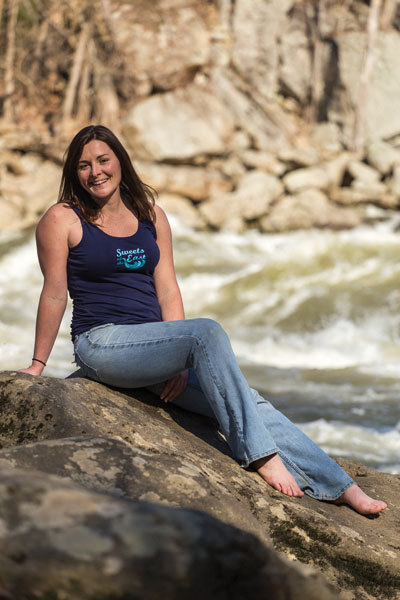
First memory on a raft: was during college. I had a friend who invited me to come down and camp at a raft outfitter and work for an outdoor photographer. I got to ride along for free and fell in love with it. I asked if I could come back next year and train and I did.
Started guiding because: I got addicted.
Most embarrassing moment on a raft: One of the first times I ran the Lower Gauley at really high water levels, around 8,000 cfs. As I was coming through Wood’s Ferry, I realized where I should have been just before we went over a giant pourover. I catapulted over the front of the raft. My body actually checked out the guy in the front and I took him with me. Then I went over another giant pourover myself and got sucked under for a full 10 seconds. When I finally popped up I saw my boat flip upstream. It was embarrassing because it was on video. I got several replays.
